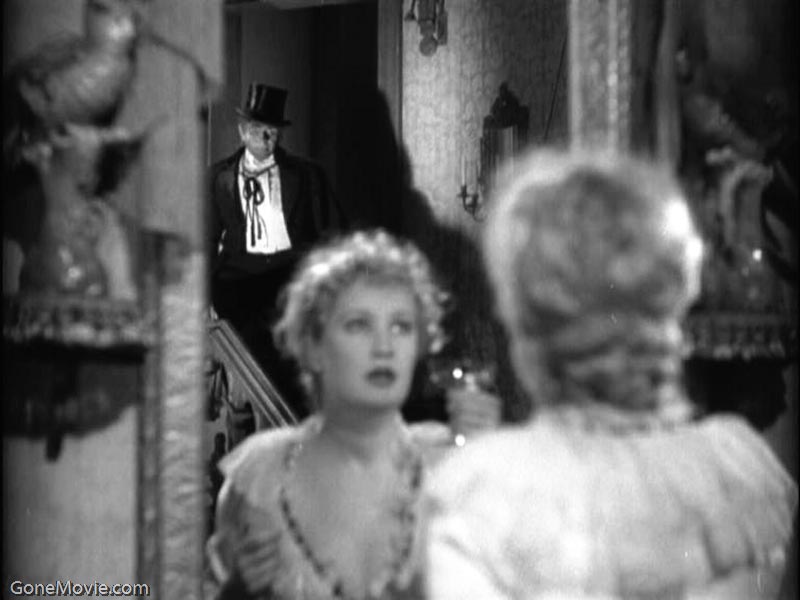At first Miriam Hopkins did not want to play ?Champagne Ivy? Pearson, the charmingly carnal little bird who is infatuated with Jekyll and abused and terrorized by Hyde. When director Rouben Mamoulian offered her the part, she set her jaw and said No. She would play the other woman in the piece?Muriel, the virtuous, long-suffering fianc?e. Mamoulian was stunned. He said, ?What?s the matter with you? She?s [Ivy?s] going to steal the film.? She said, ?She?s unsympathetic. I just don?t want to act her.? He told her that half the actresses in Hollywood would kill to play Ivy. It would make her a star. But Hopkins was adamant, and she left Mamoulian perplexed and frustrated, emotions not uncommon among those who worked with her. Bette Davis said that at the end of a day working with Miriam, she would go home and scream for an hour. Genial Edward G. Robinson wrote in his memoir that he finally lost it and slapped her, right there on the set, and the whole crew broke into applause.
But then Hopkins called Mamoulian back and said she had changed her mind. She did play Ivy, and it did make her a star. Seventy years later, when film historian Greg Mank polled filmmakers and historians for his book Women in Horror Films, 1930-1940, Hopkins won Best Performance by an Actress as a Voluptuary in a Horror Film by a landslide.
Her Ivy is a seducer who enjoys sex; but then, Ivy has no other social skills; she knows no other way to relate to men. She lives in the moment for the pleasure she can get and a few shillings to keep a roof over her head. She?s impulsive and pathetically grateful for the little bits of kindness she gets in her two brief meetings with Jekyll (in this movie pronounced as its author, Robert Louis Stevenson, did: Jee-kull, though it sounds all wrong to us). It might have been the only kindness Ivy got from a man in her whole life, and the only way she knows how to express her tenderness and gratitude is with sex. Then all her careless joy, her pleasure in her body, is destroyed by the consuming terror of being controlled and brutalized by her ?lover,? Hyde.
Ivy makes an unforgettable first impression on Jekyll and on us. When Jekyll carries her, caterwauling, up to her room from the street where she?s been knocked down by a john (the censors made them change the line from ?one of Ivy?s customers? to ?one of Ivy?s?), she?s a comic figure?so obvious when she pretends to faint, like a little girl.
She?s also a powerfully sexual presence, pressing Jekyll?s hand to her upper thigh as her eyes offer an unmistakable invitation, and in a justly famous shot that?s still a turn-on 80 years later, sitting on the side of her bed slowly swinging her naked, gartered leg and whispering, ?Come back? come back soon??
Jekyll can?t shake that image?Ivy?s shapely white leg slowly swinging on the bed,?and neither can we. It becomes the focal point for Jekyll?s frustrated desire for Muriel. Muriel?s father embodies the whole of Victorian moral conventions in a single stuffed shirt, and he is suspicious of Jekyll?s instability, his ardor, his moodiness. Naturally the general is concerned for Muriel?s happiness, and the man who has not been late to dinner in 40 years is not going to hand his daughter over to a flibbertygibbet. He removes Muriel from London for an extended holiday, leaving Jekyll to stew in his laboratory. Perhaps if not for this plot point, there would be no Mr. Hyde, and Ivy would have gone on living her dissolute life until she met some other calamity. But in this version it is sexual frustration that drives Jekyll, the good, conscientious doctor with a few crackpot theories about separating man?s highest self from his base, animal self, to unleash the latter so that he can get some relief. Unfortunately Jekyll?s base self is a sadistic horndog, and while this is unpleasant for everyone, it is Ivy?s undoing.
Jekyll has been white-knuckling it for months in his fabulous Gothic laboratory (one of the many stunning sets in the film), surrounded by skeletons, beakers, and mysterious simmering kettles. When his butler brings him Muriel?s latest postponement letter the kettle boils over, and so does Jekyll: He takes the butler?s well-intentioned advice to go out, have a little diversion. Since respectable Jekyll can?t be seen in such places, he employs the transforming elixir for the second time, and sends Hyde out on the town.
What does Hyde do? He makes for Ivy?s place, only pausing to turn up his face, mouth wide open, to noisily drink in the rain. The shot is in no way violent but still a little shocking in its pure animal joy. He frightens Ivy?s landlady but finds out where she is, and with unconcealed glee (always with an undercurrent of fury) he goes to the music hall, takes a table and orders a bottle of Champagne, beats the waiter for waiting for a tip, threatens other patrons, and demands that the boss send Ivy over to have a drink with him.
Not having yet seen Hyde, Ivy is eager to do so. The boss says that the gentleman has money, so off she goes, another day, another customer. She has the home field advantage?this is her world, and she knows the routine. She can handle him. She can take care of herself.
But as soon as she lays eyes on the ?gentleman,? her bravado collapses completely. The dynamic between them is established right away?Hyde dominates and controls, physically pressing into her space and forcefully preventing her from getting away. He refers to her as ?it? and calls her a ?little bird.?
He mocks her with endearments that drip with contempt: ?Forgive me, my dear. You see, I hurt you because I love you. I want you. And what I want, I get. I grant you, I?m no beauty. But under this exterior, you?ll find the very flower of man? Look!?Do you suppose I?d let anybody stand in my way? I love you, I love you, you understand? You?ll come with me, eh? [POV Ivy as Hyde?s face looms toward her in CU, we hear her moan in fear as he says] ? You?ll come with me.?
In her first scene Hopkins showed us Ivy?s boldness, her confidence in sexual matters. That?s how we think of her, and so it?s striking when Hyde instantly punctures her confidence and she deflates, confused and at a loss for how to extricate herself. Ivy is alone; she has no one to protect her or help her escape. She?s a perfect victim.
In the next of Ivy?s scenes, after Hyde has taken possession of her in the bar, she is in the flat where Hyde has set her up. It?s much nicer than her previous digs but Ivy has lost her naive, careless air, replaced by a desperate rumination on whether there is any possibility of getting away from Hyde. Her landlady drops by to advise her to ditch him, and Ivy explains not only that she has no financial or emotional support but that Hyde will never let her go, that he?s not a man but a demon.
Hyde interrupts their t?te-a-t?te, chases out the landlady, and gets down to terrorizing Ivy, apparently his favorite kind of foreplay. Ivy, who was the sexual aggressor in her first scene with Jekyll, is now trapped, and all she can do is focus on not enraging Hyde, who is always looking for a reason to punish and degrade her.
One of the most interesting things about this film is what makes it frightening so long after it was made. Not the old mad scientist stuff, coin of the realm in the classic horror movies of the period. Not the transformations, cleverly done though they are. The real horror is watching domestic violence up close, for that?s what?s going on between Hyde and Ivy. I?m not saying this was how the film?s writers and director would have spoken of it, but some things never change, and the workings of domestic violence are always the same. It?s similar to the most frightening thing about Frankenstein, which is when he murders a little girl who was playing with him. The most frightening things are not the fantastic monsters of Gothic imagination but the horrors of real life.
Hopkins?s portrayal of Ivy is one of the best of her truncated but distinguished career. She was enormously versatile, and she brought everything to this part, from her wit and skill at comedy to the pitiful terror of a lost girl, whipped and bruised for a maniac?s amusement, toyed with and finally killed as a cat does a little bird.
In Ivy?s last moments she toasts herself in the mirror with Champagne, believing that Jekyll has saved her from Hyde.
?Here?s hoping Hyde rots wherever he is, and burns where he ought to be. [she toasts herself in the mirror, then smiles] And here?s hoping Dr. Jekyll will think of Ivy once in a while? he?s an angel, he is?here?s to you, my angel.? She sees in the mirror the door opening behind her, and for a second fantasizes that it?s Jekyll. Then she sees that it?s Hyde.
He closes the door quietly, creeps down, filling the screen with rage. ?I know everything you do and everything you think. You went down on your knees for him [Jekyll], the man I hate more than anyone in the world. No? ?I?ll slave for you, I?ll love you. You?re an angel, sir.? You wanted him to love you. I?ll give you a love now. ? His name is Death.?
She runs for the door but he cuts her off; she runs to the bedroom and tries to keep him out, screaming. He easily pushes the door open, catches her, and takes her by the throat and chokes her. She continues to scream until?she runs out of air.
?There, my sweet. There, my dove [as he strangles her, as he lowers her toward the floor] There, my little bride. Isn?t Hyde a lover after your own heart??












Recent Comments